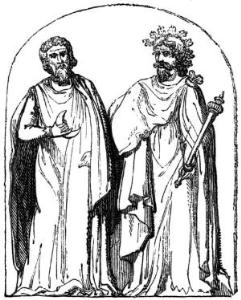|
The word 'druid' is thought to derive from the Greek drus (oak) and the Indo-European wid (wisdom) - implying that they are the people who know the wisdom of the trees. The fragments of literature on ancient Druidism leave considerable room for interpretation of Druid belief and practices.
 The druids were known as the "wise men" of the Celts. Many books have been written about them yet almost nothing is known about the druids. Their beliefs were esoteric and passed on orally. Their practices, for the most part, were not public and they left no written traditions and no major temples where art might provide a key to some of the druids' activities. The druids are mentioned by the ancient Roman authors * Strabo, Diodorus, * Posidonius and Julius Caesar. They were often called 'priests' and 'philosophers', as well as soothsayers and witches. Many stories have risen about them, mostly from speculation and rumor. They have been said to practice human sacrifice and cannibalism. Yet, the Druid religion is spiritually nature-based way of life and its worship cycle was marked by the movements of the Sun and Moon. The druids were known as the "wise men" of the Celts. Many books have been written about them yet almost nothing is known about the druids. Their beliefs were esoteric and passed on orally. Their practices, for the most part, were not public and they left no written traditions and no major temples where art might provide a key to some of the druids' activities. The druids are mentioned by the ancient Roman authors * Strabo, Diodorus, * Posidonius and Julius Caesar. They were often called 'priests' and 'philosophers', as well as soothsayers and witches. Many stories have risen about them, mostly from speculation and rumor. They have been said to practice human sacrifice and cannibalism. Yet, the Druid religion is spiritually nature-based way of life and its worship cycle was marked by the movements of the Sun and Moon.
The year was marked by the changing positions of the rising sun, the solstices and equinoxes, and the four additional festivals halfway between these four that marked important points in the agricultural seasons. The ancient megaliths and stone circles, such as Stonehenge, have often been associated with the Druids.
A Brief History of Druidry / About the Druids
|